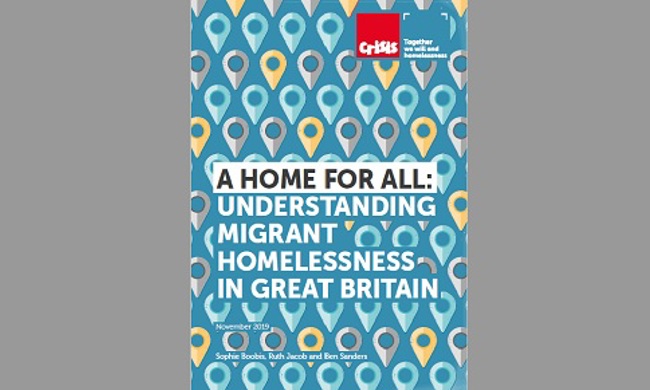A Home For All: Understanding Migrant Homelessness in Great Britain
26.11.2019
This report presents the findings of Crisis scoping research that sought to understand what is currently known about migrant homelessness and identify any gaps in evidence. The research looked at the scale of homelessness among non-UK nationals, the different experiences of homelessness that migrants face across Britain and how services are responding to this.
Key findings
- The scale of migrant homelessness has increased. Nearly seven out of 10 (67%) survey respondents said that the scale of migrant homelessness in the areas that they worked in had increased in the last 12 months. Just under a fifth (17%) state that it has increased a lot.
- Restrictions on benefit entitlements make it harder to both prevent and end people’s homelessness. Among survey respondents the two most reported barriers impacting on people experiencing homelessness who are not originally from the UK related to lack of income (93%) and lack of access to financial support (89%).
- Being unable to access benefits leads to a desperation for employment, and alongside the precarious nature of housing, this creates situations where people are extremely vulnerable to exploitation.
- Access to housing was one of the largest barriers - 84 per cent of survey respondents reported that the people they work with experience access to housing as a barrier to support, and 82 per cent reporting that the people they work with generally lack entitlement to housing benefit it’s clear that access to housing is at the heart of the barriers facing the migrant homeless population.
- Legal advice for migrants experiencing homelessness is paramount but has been severely affected by cuts to legal aid. Over 50 per cent of survey respondents said they provided legal support or advice. In addition, 67 per cent of survey respondents stated that legal aid cuts have had an impact on migrant homelessness.
- The majority of survey respondents reported that support needs had increased across all migrant groups. Many of the issues raised were things that are common challenges within homelessness services, such as mental health or substance misuse, but for the migrant population these can be exacerbated by their immigration status.
- Brexit and the implications on EEA nationals was one of the biggest concerns of those organisations we spoke to, sixty-two per cent of survey respondents identified this as their biggest concern for future impact on migrant homelessness.
Reference
Boobis, S., Jacob, R., and Sanders, B. (2019) A Home For All: Understanding Migrant Homelessness in Great Britain. London: Crisis

